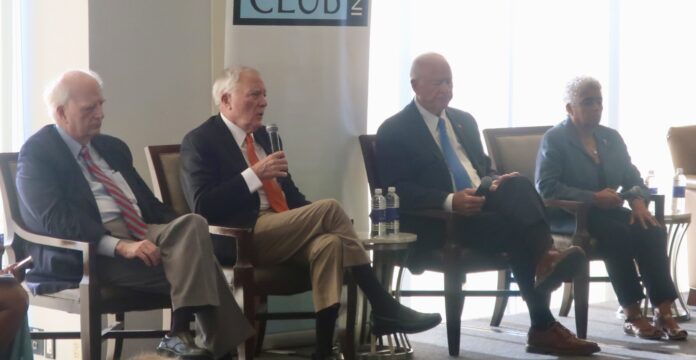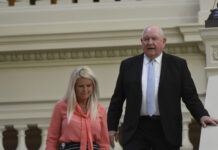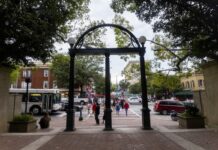
(Georgia Recorder) — A bipartisan group of influential former Georgia elected officials stressed at an Atlanta Press Club event Monday the importance of building confidence in Georgia’s elections heading into the Nov. 5 election.
Former Republican Gov. Nathan Deal, former Democratic Gov. Roy Barnes, ex-Republican U.S. Sen. Saxby Chambliss and former Atlanta Democratic Mayor Shirley Franklin gathered together for the first time Monday since teaming up in June in support of the Democracy Defense Project’s national effort to restore trust in statewide elections.
Over the last few weeks, the four members of Georgia’s Democracy Defense Project have appeared on radio shows, written op-ed columns, posted on social media and explained the laws and protocols in place protecting Georgia’s election system as they they seek to combat misinformation that’s played a role in the public’s waning trust since the 2020 presidential election.
Panel moderator and Atlanta Journal-Constitution political reporter Greg Bluestein asked the Republican members how GOP leaders can counteract messages that continue to undermine faith in elections. He referenced a recent AJC poll which shows that about three-quarters of Republicans and one-third of independents still believe there is widespread election fraud.
Deal said members of the Republican Party must ask why it’s putting some people in leadership positions who continue to spread distrust in elections without credible evidence.
“Are we allowing them to be talking about things that they can’t prove?” asked Deal, who spent two terms as governor before leaving office in early 2019. “If they are there, they’re doomed for failure. Neither party should be going into any election with the idea that they’re going to explain away the reason they lose by setting it up in advance. Whoever played a basketball game, football game with that kind of attitude. You can’t blame the referees after the game is already over with.”
MORE Majority of Georgia Latino voters in new poll lean toward Harris
Monday’s Atlanta Press Club event was held the day before Democratic Vice President Kamala Harris and former President Donald Trump are set to face each other at the first presidential debate since President Joe Biden dropped out of the race in July.
Georgia was at the center of failed attempts to overturn the results of the 2020 presidential election in the state, which Trump narrowly lost to Biden by about 12,000 votes.
The results of the 2020 election were upheld after three separate counts, including one done by hand. Investigations following the election failed to turn up widespread voter fraud.
The fervor over the 2020 election culminated in a violent riot at the U.S. Capitol as Congress worked to certify the results, briefly delaying the administrative process.
Several panel members expressed concern Monday that a repeat of 2020 tensions could occur this fall if Trump is defeated again in November.
Franklin said she was inspired to join the group based on her experiences as a child hearing adult family members debate politics and later in her first bid for Atlanta mayor. In 2001, she narrowly defeated several other candidates after receiving slightly more than 50% of the votes.
Franklin would hold her edge during a recount to become Atlanta’s first Black woman mayor and would remain in office for a second term until 2010. She also said it’s her desire to use her influence to quell distrust in elections expressed by some Black voters and other minorities.
“I lost three votes in the recount, but there was never a question as to whether the votes were fair,” Franklin said. “It seems to me that’s fundamental to democracy, fundamental to our values as a country and it’s fundamental to our success as a country.”
Chambliss, who served in Congress from 1995 to 2015, including in the House of Representatives and the U.S. Senate, said every major statewide election has a hint of fraud. However, he said it is a big leap from the few confirmed examples to claims of widespread corruption.
The integrity of Georgia’s vote tally is defended by well-trained election officials, poll workers, and partisan poll monitors watching the process take place, said Chambliss, who was a candidate in 14 elections, including at the district level and statewide.
“We always made sure that we had the right people at the polling places to make sure that they were looking out for our interest,” he said. “At the end of the day, they could come back to us and say that, yes, the election was carried out in the right process, and it was fair.”







